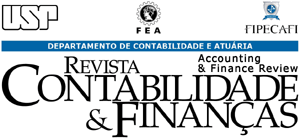ABSTRACT
This study aims to explain the extent to which brain mapping patterns follow behavioral patterns of auditors and accountants’ judgments when assessing evidence for decisions involving going concern. This multidisciplinary research involved investigating the relation between the theory of belief revision, neuroscience, and neuroaccounting with a sample of auditors and accountants. We developed a randomized controlled trial study with 12 auditors and 13 accountants. Auditors and accountants presented similar judgments about going concern, specially demonstrating greater sensitivity to negative evidence. Despite similar judgments, results showed diverging brain processing patterns between groups, as distinct reasoning was used to reach going concern estimates. During the decision process, auditors presented homogeneous brain processing patterns, while accountants evidenced conflicts and greater cognitive effort. For both groups, the occurrence of maximization (minimization) of judgments is observed in brain areas associated with identification of needs and motivations linked to individuals’ relations with their social group. This was strengthened by the lack of significant differences between the regression maps of auditors and accountants, leading to interpretation of the groups’ findings as homogeneous brain behavior. Despite familiarity with the executed task and knowledge of auditing standards, as a result of the greater use of algorithmic reasoning the auditors’ judgments were similar to that of accountants. On the other hand, the accountants’ greater cognitive effort, due to the experiencing of greater conflict in the decision-making process, made them use more quantic brain processing abilities, which are responsible for conscious reasoning. This was observed in the maximizations (minimizations) of the estimates in brain areas related to concerns with the judgments’ social repercussions, which culminated in some degree of “conservatism” in their decisions. Furthermore, these findings reveal another opportunity to discuss the assumption of the brain as the original accounting institution.
Keywords:
neuroaccounting; cognitive brain mapping; going concern; belief revision

 Thumbnail
Thumbnail
 Thumbnail
Thumbnail
 Thumbnail
Thumbnail
 Thumbnail
Thumbnail
 Source: Prepared by the authors
Source: Prepared by the authors

 Source: Prepared by the authors
Source: Prepared by the authors
 Source: Prepared by the authors
Source: Prepared by the authors